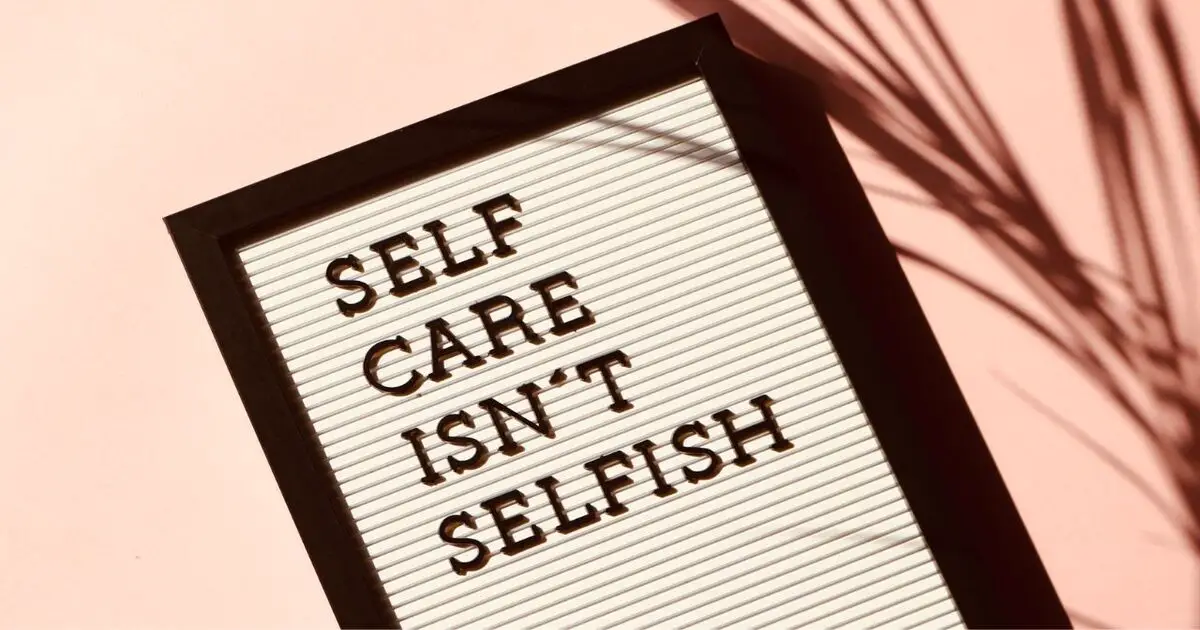How To Truly Practice Self-Love: Learn What It Is!

Self-love is a practical necessity. It’s the foundation for emotional resilience, mental stability, and the ability to maintain healthy relationships. When you commit to the practice of self-love, you reduce stress, improve your internal dialogue, and elevate your self-worth.
The act of self-love is to take responsibility and nurture your well-being. It’s not about external validation or narcissism. It’s about internal recognition and being self-compassionate.
What Is Self-Love
Self-love is the fundamental practice of appreciation and compassion toward oneself that encompasses physical, emotional, mental, and spiritual well-being. It involves accepting yourself fully while actively nurturing your growth and happiness.
Core Components of Self-Love
Self-love includes several key elements:
What Self-Love Is NOT
Self-love is often misunderstood. Many confuse it with narcissism, but these concepts differ fundamentally. Narcissism steals your ability to truly love yourself. It creates endless searching for fulfillment through superficiality.
Self-love is not selfishness. Selfish behavior prioritizes wants over needs and disregards others. True self-love means taking care of your needs, not sacrificing well-being to please everyone else. It involves recognizing your intrinsic worth beyond external validation.
Self-love is not conditional. You don’t need to achieve specific goals first. There’s no waiting period or perfect timing required. You can choose love now, in this moment, even when things feel messy.
Self-love is not entitlement. The phrase “I deserve to be loved” can create false expectations. You earn respect and love through your actions, not through demands. True self-love involves taking responsibility for your behavior.
Self-love is not indulgence. It’s not about satisfying every desire or avoiding discomfort. Real self-love means making choices that nurture long-term well-being. It requires honest self-assessment and willingness to grow.
Spiritual Dimension
Self-love connects deeply to spiritual awakening and transformation. When you cultivate genuine self-compassion, you’re nurturing the divine essence within yourself. This practice creates space for deeper spiritual connection and authentic living aligned with your true values.
Self-love manifests through daily choices: speaking kindly to yourself, honoring your emotions, setting boundaries with toxic relationships, pursuing activities that bring joy, and forgiving yourself for mistakes. It’s an ongoing practice that requires patience and dedication.

20 Tips On How to Love Yourself
Self-love is a transformative practice that requires intention and consistency. Here are 20 detailed tips to help you cultivate a deeper, more compassionate relationship with yourself.
1. Practice Daily Mirror Work
Stand in front of a mirror and make genuine eye contact with yourself. Say loving affirmations like “I love you” or “You are worthy of good things.” Focus on inner qualities beyond physical appearance.
This practice rewires negative thought patterns and builds self-acceptance through consistent positive reinforcement.
2. Embrace Mindfulness and Present Moment Awareness
Practice mindfulness by focusing on your breath or observing your surroundings without judgment.
Being fully present allows you to understand yourself better and respond to your needs with kindness rather than rushing to fix everything. Mindfulness creates space between you and your thoughts.
3. Set Healthy Boundaries
Learn to say “no” to protect your energy and well-being. Having free time doesn’t mean you have the emotional capacity to fill it. Setting boundaries allows you to advocate for your needs instead of constantly responding to others’ demands.
This might mean limiting conversations with energy-draining people or declining social invitations when you need rest.
4. Create a Personal Safe Space
Designate a physical area that feels peaceful and worry-free. This could be your bedroom, a corner with candles, or even your car. Having a dedicated space for self-care and reflection gives you somewhere to focus on your needs when life feels overwhelming.
5. Practice Self-Forgiveness
Extend the same compassion to yourself that you’d offer a dear friend. When you make mistakes or behave in ways you regret, notice negative self-talk without giving into self-criticism. Remember that challenges and imperfections are part of being human.
6. Acknowledge Your Emotional Landscape
Take time to identify where you struggle most with self-love. Notice when you feel judgmental, critical, or ashamed. Understanding your emotional patterns helps you respond with kindness rather than react from old wounds.
7. Prioritize Comprehensive Self-Care
Self-care goes beyond bubble baths. Attend to basic needs like nutritious food, adequate sleep, hydration, and movement. Also, carve out time for activities you genuinely enjoy. Self-care transforms loving thoughts into concrete actions.
8. Eliminate Harmful Comparisons
Stop measuring your worth against others’ achievements or social media highlights. Each person has a unique path, timeline, and set of circumstances. Focus on your own growth and celebrate personal victories, no matter how small.
9. Practice Gratitude Toward Yourself
Write down three things you appreciate about yourself daily. Include character traits, accomplishments, efforts, and growth. Acknowledging your positive qualities trains your brain to notice what’s going well rather than fixating on perceived flaws.
10. Visualize Your Ideal Self
Close your eyes and imagine the best version of yourself. Picture how you look, act, and feel when living authentically. Focus on details like your confident posture, radiant energy, and aligned actions. Revisit this vision regularly to reinforce your connection to your empowered self.
11. Create Mood-Boosting Rituals
Develop personal ceremonies that lift your spirits. This might include morning gratitude, evening journaling, listening to uplifting music, or lighting candles. Consistent rituals create positive anchors throughout your day.
12. Give Yourself Physical Affection
Hug yourself, gently massage your arms and legs while saying “I love you,” or sleep without restrictive clothing to connect with your body. Physical self-touch releases oxytocin and reinforces the message that you deserve care and comfort.
13. Keep a Self-Love Journal
Write letters to yourself, document your growth, and record moments when you felt proud or grateful. Journaling helps process emotions, track progress, and create a written record of your self-love journey for challenging days.
14. Ask for Help When Needed
Recognize that self-love includes knowing your limits and seeking support. Even confident people need assistance sometimes. Maintaining connections with loved ones while growing in self-sufficiency demonstrates mature self-awareness.
15. Celebrate Small Wins Daily
Acknowledge everyday achievements like getting out of bed on difficult days, choosing a healthy meal, or speaking up for yourself. Celebration reinforces positive behaviors and builds momentum for larger changes.
16. Move Your Body Joyfully
Dance freely in your room, go for nature walks, or try activities that make you feel alive. Movement helps you reconnect with your body and express emotions that words cannot capture. Focus on how movement feels rather than how it looks.
17. Curate Your Environment
Surround yourself with items, people, and experiences that support your well-being. Remove or limit exposure to negativity, toxic relationships, and energy-draining environments. Your surroundings should reflect and nurture self-love.
18. Practice Loving Self-Talk
Replace harsh inner criticism with the kind words you’d offer a friend. When you notice negative thoughts, pause and ask, “What would I say to someone I care about in this situation?” Then offer yourself that same compassion and encouragement.
19. Honor Your Authentic Voice
Trust your instincts, preferences, and values even when they differ from others’ expectations. Self-love means honoring your true self rather than conforming to please others. Practice expressing your genuine thoughts and feelings in safe relationships.
20. Remember Self-Love is a Journey
Accept that some days will be easier than others. Self-love isn’t a destination but an ongoing practice of showing up for yourself with patience and compassion. Progress isn’t always linear, and that’s perfectly normal.
These practices work best when implemented gradually. Please choose one or two tips to focus on initially, then slowly incorporate others as they become natural habits. Self-love is a skill that strengthens with consistent, gentle practice.

What Are Common Challenges in Practicing Self-Love Consistently
Practicing self-love consistently can be one of life’s most challenging endeavors, even though it sounds simple on the surface. Understanding these common obstacles can help you navigate your self-love journey with greater compassion and realistic expectations.
Perfectionism Trap
Perfectionism creates an impossible standard that blocks self-love. When you believe you must always do better, achieve more, or reach flawlessness to be worthy of love, you’re setting yourself up for constant inadequacy.
Since perfection is unattainable, this mindset deepens feelings of unworthiness and makes it nearly impossible to accept yourself as you are.
Fear of Vulnerability
Self-love requires radical honesty about your flaws, insecurities, and deeply rooted beliefs. This level of vulnerability can feel intimidating, especially in a world that often rewards image over authenticity. Facing your shadow aspects and accepting them with compassion takes tremendous courage.
Comparison Culture
Social media comparison is a powerful force that derails self-love. It’s easy to lose sight of your own worth when constantly measuring yourself against others’ highlight reels. This creates distance between who you are and who you think you should be, making self-acceptance harder to cultivate.
External Validation Dependency
Many people measure their self-worth by what others think of them. This struggle is particularly hard for those who experienced rejection or judgment early in life.
Until you take your self-worth back into your own hands, you’ll remain dependent on external approval rather than cultivating internal love.
All-or-Nothing Thinking
Expecting to go from self-hate to self-love overnight sets unrealistic expectations. When you’ve only ever felt self-criticism, jumping straight to self-love feels impossible. Many people skip the crucial step of self-acceptance, which serves as a bridge between self-rejection and genuine self-love.
Past Mistake Punishment
Holding onto past regrets creates a barrier to self-love. If you’re unable to forgive yourself for mistakes, you’ll remain stuck in self-punishment mode. True self-love means seeing mistakes as learning opportunities rather than evidence of unworthiness.
Misunderstanding Self-Love
Many people think self-love means never having bad days or negative thoughts about themselves. This misconception creates unrealistic expectations. Authentic self-love means treating yourself with grace, acceptance, and kindness while riding all of life’s waves, not eliminating all problems.
Selfishness Guilt
People who’ve spent their lives pleasing others often feel selfish when prioritizing themselves. When you’re used to putting yourself last, self-love can feel like you’re hurting others. This guilt prevents consistent self-care and boundary-setting.
Waiting for “Perfection”
Many people postpone self-love until they become their ideal version. If you’re waiting to be “perfect” before loving yourself, you’ll never get there because perfection doesn’t exist. The only moment you have to love yourself is right now, exactly as you are.
Difficulty Accepting Compliments
Struggling to accept praise reveals underlying self-worth issues. When someone battles self-love challenges, they often find it difficult to believe they deserve recognition. They may downplay accomplishments or feel uncomfortable when receiving positive feedback.
Fear of Solitude
A fear of being alone often stems from a lack of self-love. If you can’t enjoy your own company, you might constantly seek external validation to avoid facing yourself. This leads to unhealthy relationships and choices that don’t serve your well-being.
Negative Self-Talk Patterns
Harsh inner criticism becomes so automatic that many people don’t even notice it. Years of negative self-talk create neural pathways that make self-compassion feel foreign and unnatural.
Trauma and Past Wounds
Unprocessed trauma can distort self-perception and break down self-esteem. Previous experiences of abuse, neglect, or criticism create deep-seated beliefs about unworthiness that require professional support to heal.
Ignoring Basic Self-Care
Neglecting physical and emotional needs signals underlying self-love issues. When you’re too busy, tired, or consumed by others’ needs to care for yourself, you’re essentially communicating that your well-being doesn’t matter.
Inconsistent Practice
Self-love requires daily commitment, but life’s demands often push personal needs to the bottom of the priority list. Without consistent practice, self-love remains an abstract concept rather than a lived experience.
Moving Forward
Remember that these challenges are normal parts of the self-love journey. Progress isn’t linear, and some days will be harder than others.
The key is recognizing these patterns without judgment and gently redirecting yourself toward self-compassion.
Consider seeking professional support if past trauma or deeply rooted patterns feel overwhelming to address alone.

Identify and Challenge the Inner Critic
Your inner critic doesn’t tell the truth. It recycles outdated stories shaped by fear, shame, or unresolved trauma. These narratives often begin early in life and go unchecked unless consciously examined.
To dismantle the inner critic, start by recognizing that self-love means no longer allowing those voices to run your internal dialogue unchallenged. Self-love means choosing self-acceptance over self-rejection, especially when you’re vulnerable.
Here are some simple daily actions to weaken that voice:
These practices help retrain your internal response system. When practiced consistently, they shift your self-perception and make space for self-acceptance to grow.
That’s what dismantling the inner critic involves: rewriting your story through the lens of compassion, truth, and emotional clarity.
Limiting Beliefs
Limiting beliefs create unconscious ceilings. They quietly shape your view of what’s possible and define where you believe your path in life can go.
These beliefs are often formed early through rejection, failure, or unresolved shame. They distort your self-image and narrow your ability to see clearly.
Common examples include:
These thoughts feel like facts, but are only stories. You begin to break them by taking small, deliberate actions that contradict them. This could be speaking up when you’re used to staying silent. Or applying for something you believe is beyond you.
This is a process of self-discovery. Each action you take reveals more of who you are without judging the past version of yourself. It’s how you start rewriting the limits you’ve accepted.
When you challenge a belief with evidence, you don’t just change your thoughts. You begin to shift your self-image.
Self-love means creating enough space within to explore who you are becoming. It’s not about becoming someone new. It’s about removing what never belonged and the old ways of thinking.
Subscribe to Create Higher Vibrations!
Get Inspiration and Practical advice straight to your inbox.
The Role of Boundaries in Practicing Self-Love
Setting Boundaries is not selfish. They’re how you signal to others, and yourself, that your time and energy matter.
Setting healthy boundaries means:
This is not rejection. It’s an act of self-preservation and a form of self-respect.
When you enforce boundaries, you stop seeking love through compliance. You begin to love and accept yourself without needing to perform. You are learning to appreciate yourself.
Shift Through Positive Self-Talk and Affirmations
Affirmations are not magic words. They only work when they are tied to what you value and repeated with emotional clarity.
Positive affirmations are most effective when you believe them or are willing to believe them over time.
To make them useful, stop and ask yourself what you ruminate on most. What thoughts repeat that drain your energy or lower your confidence?
That’s where assurances come in. They help rewire the language you use inside your mind.
Choose statements that shift your attention:
These are not just things to say. They are tools to interrupt patterns. When you say them with presence, they stop the cycle of ruminating. Over time, they guide you back to what brings you joy and peace.
The goal is not perfection. The goal is to change how you relate to yourself when things feel uncertain. Positive affirmations help you return to yourself, one phrase at a time.

Self-Love Isn’t Optional
Self-love isn’t reserved for confident people. It is the daily practice that helps build confidence from the inside out.
Self-love looks different for everyone. What matters is that your actions reflect care for your body and mind. The practice is personal and shaped by your emotional needs, physical routines, and internal self-talk.
Some examples include:
These may appear small, but they change your thought patterns over time. When done regularly, they help you build trust in yourself. That trust creates stability.
Self-love is not performance. It is a means to love yourself through consistency. It asks that you stop waiting to feel worthy and instead start acting like you already are. When you do, you create a path in life that is led by presence, not perfection.
This is how self-love looks when it is real. You choose what supports you. You stop chasing who you think you should be. And you allow yourself to simply be, without judging the process.
Bottom Line
Self-love isn’t a destination. It’s a relationship you cultivate every day. You don’t arrive, you commit.
You will have days when it’s hard. That doesn’t mean you’re failing. It means you’re human.
Ask: What would self-love do right now?
Then do it.
If you’re finding it hard to embody these practices, I can help. As an Embodiment Coach, I guide people back to their inner clarity, their power, and their ability to build a life rooted in respect for self.
Reach out when you’re ready to stop abandoning yourself.
Start with action. Practice until it becomes your baseline. That’s how you learn to love yourself.
This is how self-care looks. In word, in body, in decision.


